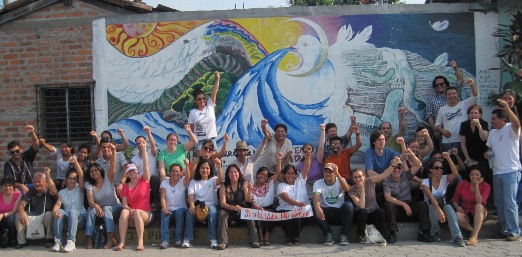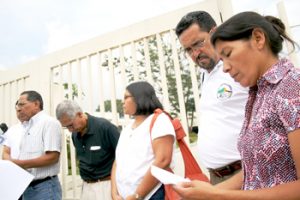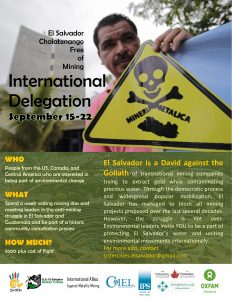Defending Natural Resources, Delegations
30 Activists from Around the Globe Visit El Salvador to Support Anti-Mining Fight
From May 10th to 13th, thirty activists from 12 different countries, including Canada, the U.S., Germany, Mexico, Ecuador, Guatemala and Honduras, participated in a fact finding mission in El Salvador to investigate the effects of gold mining on the environment, public health and social cohesion. The delegation was organized by the National Rountable Against Mining in El Salvador and the International Allies against Mining, a coalition of economic justice, environmental and human rights groups.The delegation began with an International Conference on Water and Mining at the University of Central America that was attended by over 150 people and featured presentations by the Human Right’s Ombudsman’s office and representatives from organizations like Oxfam, the Institute for Policy Studies and the Interamerican Platform for Human Rights who have been supporting the fight against the abuses of extractive industries throughout the continent.
After the conference, the group, which included environmental, human rights and immigrant rights activists, and members of the Roundtable Against Mining traveled to Cabañas to meet with the grassroots organizations that have led the fight against the Canadian mining company Pacific Rim and whose members have been victims of assassinations and death threats. From there the delegation split into two, with some traveling to San Sebastian, the sight of the defunct Commerce Group mine and others traveling to Asuncion Mita, a small town near the border with Guatemala where the Canadian company GoldCorp operates a gold mine. The group in San Sebastian saw first-hand the pollution of the San Sebastian River and met with community members.
In Asuncion Mita, delegates attended a mass in which the Franciscan priest Domingo Solis, a member of the Roundtable against Mining, talked to the packed church about the dangers of mining. Father Domingo had the delegation stand with him as he explained the delegation and the fear in El Salvador that the Cerro Blanco mine will not only pollute the surrounding communities in Guatemala, but will also pollute the Guija Lake in El Salvador and the Lempa River, which it connects to.
After Father Domingo spoke, a delegate from Toronto, Canada addressed the crowd, saying how ashamed she felt to come from the city where GoldCorp and so many other mining companies are headquartered, and reaffirming the Allies Coalition’s commitment to work for justice for the affected communities of Central America.
See a preliminary report from the delegation below
International Organizations Urge Canadian Company to Drop its Suit against El Salvador
May 13th, 2013
Oscar Lopez for the Diario Co-Latino
Today, the International Allies Coalition against Metallic Mining in El Salvador and the National Roundtable Against Mining urged the Canadian company Pacific Rim to withdraw its lawsuit against the Salvadoran state. Pacific Rim is suing El Salvador through the International Center for the Settlement of Investment Disputes (ICSID) of the World Bank in Washington, for having denied the company permission to start the El Dorado gold mine, in the department of Cabañas.The mining company demands that El Salvador reimburse the company for at least $77 million.
In 2012, the ICSID rejected that the Canadian mining company, which has U.S. investors, based its lawsuit in the Central American Free Trade Agreement (CAFTA) signed between Central America and the United States. However Pacific Rim was able to continue its lawsuit based on the investor protections in the Investment Law of El Salvador.
In this regard, Manuel Pérez Rocha of the Institute for Policy Studies (IPS) stated that the the mining company’s lawsuit is an “extortion of the Salvadoran people.” Pérez Rocha said “we will continue bringing international attention to the Pacific Rim lawsuit as an example of perverse system that is allowed under the free trade agreements.”
During the course of a three day verification mission, coalition members visited sites that are emblematic of the issue of mining in the country, including the town of San Sebastian, where the mining company Commerce Group operated; the department of Cabañas, where the stalled gold mining project El Dorado is located, and the municipality of Asuncion Mita in Guatemala, on the border with El Salvador, where Goldcorp is seeking to develop the Cerro Blanco mine.
Some preliminary findings of the visits were, in the case of the mine San Sebastian in La Union, that there have been definite impacts on local water sources.”We were able to confirm the pollution of the river by acid mine drainage, the poverty and the limited possibilities for sustainable development,” the coalition said in a press release.In the case of the Cerro Blanco mine, coalition members verified that Goldcorp used “perverse strategies” to open the mine, violating the right of the surrounding communities to oppose such projects.
The coalition expressed its support for the proposed law to prohibit mining in El Salvador and the proposed Water Law of the National Water Forum, and urged the government to recognize the Human Right to Water and to protect of water sources from destructive industries like metallic mining.The coalition also called on the Canadian government to withdraw its support for Pacific Rim and Goldcorp, given the threats and abuses of the individual and collective rights of the communities in El Salvador.
“Gold Mining and the Defense of Water in El Salvador”
International Delegation to El Salvador, May 10-13, 2013
Preliminary Report
May 22, 2013
From May 10-13 2013, an international delegation from 12 countries representing 22 human rights, social justice and environmental non-profit organizations and advocates, along with academics, journalists, artists and grassroots activists, carried out a three day tour of El Salvador to examine experiences with gold mining operations and the defense of water.
The delegation visited three emblematic sites: (1) the town of San Sebastian, department of La Unión where Milwaukee-based Commerce Group operated a gold mine off and on starting in 1968 until the government revoked its license in 2006 on environmental grounds; (2) communities in the department of Cabañas where Vancouver-based Pacific Rim Mining’s exploration activities gave rise to widespread opposition, and the company failed to obtain the permit to put its El Dorado gold project into production; (3) the town of Asunción Mita, department of Jutiapa, Guatemala, on the border with El Salvador, where Goldcorp’s Cerro Blanco gold project threatens a transnational watershed and could provoke a transborder conflict.
Both Commerce Group and Pacific Rim Mining are currently taking advantage of unjust investor protection mechanisms to sue the government of El Salvador for a total of over $400 million dollars in the International Center for Settlement of Investment Disputes (ICSID), a Washington, D.C.- based World Bank tribunal. Meanwhile, their operations have had significant social and environmental impacts on affected communities.
(1) Commerce Group, La Unión
In San Sebastian, we saw the consequences of industrial mining on the local watershed and public health. We saw the lasting and unmitigated impacts of acid mine drainage in the rust-colored water of the San Sebastian river. We heard from local residents that instead of generating wealth for communities, large-scale mining leaves behind poverty and negates the possibility for economically, socially or environmentally sustainable development. We also learned of high incidence within the area of kidney failure, cancer, skin problems and nervous system disorders, such as Guillain Barre Syndrome. What we have seen in San Sebastian should not be allowed to happen in Cabañas or elsewhere.
(2) Pacific Rim Mining, Cabañas
In Cabañas, representatives of local organizations challenged myths that Pacific Rim has perpetuated in order to promote its gold-mining project to the Salvadoran public. Whereas Pacific Rim has claimed that its project would bring economic growth and jobs, community members stated that the company’s presence has generated social divisions and led to violence. Local activists emphasized that they are opting for economically, socially and environmentally sustainable solutions, not mining, and expressed frustration that the murders of anti-mining activists Marcelo Rivera, Ramiro Rivera, Dora Alicia Sorto and Juan Francisco Durán Ayala have yet to be fully investigated. Whereas the company has claimed it will leave the water cleaner that it began after its industrial open-pit and underground gold mining operations, we heard that the community has empowered itself with knowledge and skills to better understand and protect their water supplies. In particular, one local organization has carried out a baseline water study, something found to be largely lacking in the Environmental Impact Assessment that Pacific Rim originally presented to the Ministry of Environment, and is taking steps to identify threats and improve local water management.
(3) Goldcorp, Jutiapa
In the town Asunción Mita, Guatemala, a short distance from the Salvadoran border, we heard about how local workers were recently let go from the mine, presumably because it has been flooded with hot water from a geothermal aquifer. The geothermal water, as well as surrounding soil and rock has been found to contain toxic arsenic in concentrations exceeding health standards. Community members expressed concern about possible contamination from water discharged from the mine and its impact on those who depend on fishing for their livelihood and food security. They also indicated that they did not know about the project until it was already approved and that “gifts” from the mining company in the form of projects and services had created social divisions, denying them the right to prior consultation and any opportunity to say no. Guatemalan civil society organization, Madre Selva, has publicly demonstrated that the project’s Environmental Impact Assessment (EIA) was approved without citizen participation, using insufficient and incorrect data.
Immediately downstream of Goldcorp’s Cerro Blanco project is the Güija Lake, which straddles the border between Guatemala and El Salvador, at the headwaters of the Lempa River watershed. The Salvadoran Ombudsman in Defense of Human Rights has determined, based on the importance of this watershed to the small, densely populated country, that this very high risk project poses a serious threat to the human rights of Salvadorans, including rights to life, health, a safe living environment, water and access to information, and as such is a threat to the country’s sustainable development.
Preliminary Recommendations:
We recognize the National Roundtable on Metal Mining (known as‘La Mesa’ or ‘The Roundtable’) as a broad-based civil society coalition in El Salvador that has brought together community voices and made mining a national issue in El Salvador.
We affirm the following demands of La Mesa:
- We call on Pacific Rim Mining and Commerce Group to drop their lawsuits against El Salvador and to cease their attempts to mine in El Salvador,
- We support La Mesa’s efforts to have a law passed that will prohibit metallic mining in El Salvador and urge the Salvadoran National Assembly to discuss and approve their proposed bill in 2013,
- We encourage presidential candidates to debate and assume the commitment to ban metallic mining in El Salvador,
- We congratulate the office of the Ombudsman for the Defense of Human Rights for its principled stance against mining in El Salvador and urge that its recommendations be implemented, including that the Salvadoran government activate national and regional bodies to protect the rights of the affected population, including their rights to prior consultation,
- We call on the Salvadoran government to bring the murders of anti-mining activists in Cabañas and environmental devastation in San Sebastian to justice,
- We urge the National Assembly to approve the water law proposal put forward by the Foro del Agua, including the recognition of the human right to water and protection of water resources from destructive industries like mining.
Furthermore:
- In light of serious allegations and evidence of abuses of individual and collective rights of communities in El Salvador and Guatemala, we call on the Canadian government to withdraw any support it may be providing to Pacific Rim Mining and Goldcorp, and to pass legislation in Canada that would oblige such companies to respect international human rights laws and standards.


-300x225.jpg)

